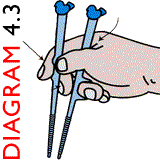Bern Mulvey
2 POEMS
JIZOU AT TSURUGA BAY
For Masaki Nakajima
Is this your answer then, to become a god?
They found the body already transformed,
bursting its seams. My wife touched the rents
as if she could still find you in, bent over
your books, too busy to answer a simple
knock. Can you remember that final walk,
the cold water to your ankles, your knees,
then upward until the life bubbled out?
Mother-in-law has shown me your room.
See, she said, it is untouched, as if I
had doubted, as if such fidelity
should matter. Brother, on your beach the wind
raises naminohana, like quicksilver
ghosts. They summon you, it is the kagura,
the dance of the gods. Be with us now,
allow us at least this solace, plum wine
in a shared cup, daikon from our garden,
the mourning candle, its long, fragrant leaving.
Jizou—Small statue placed at the scene of death to mark the passing of a loved one. Believed to have powers to safeguard and to heal.
Naminohana—A phenomenon peculiar to Japan's west coast, specifically the 'figures' sometimes formed out of sea foam by wind and surf.
__
THE KOREAN YOUTH CHOIR VISITS THE HEIWA KOUEN AT ASUWAYAMA
May 9, 1999
Peace Park, yet the grounds
are full of mourners, uneasy,
fresh from the dead, the graves
around and under us. The choir
have taken out their voices,
they have adjusted pitch and key.
My landlady sighs, says again,
This will be beautiful. They
are like your blacks, you know?
and words die in me. Enemy,
your name is mirror, cheeks
swelling with like speech,
the same downward slant of eye,
Cain's blue spots. We stand
on Asuwayama, the 'Mountain
of Dead,' the great monument,
five generations and growing,
Japanese and Korean, layer
upon fatal layer. Nothing
is forgotten. Next to us,
an old lady shakes her head,
whispers They'll be heard
as if song were a distraction
the Dead would resent.
And all about us now,
music, like a bloom of violets.
In front, a child calls out
and is hushed.
Asuwayama—Name of an artificial 'mountain' in Fukui City, originally created as a multi-terraced tomb to hold the city's dead (especially war dead), but now also housing a zoo, a museum, and a 'peace park' (heiwa kouen).
____
On "Jizou at Tsuruga Bay":
This one's about a family—my wife's family—trying to pick up the pieces after a suicide.
On "The Korean Youth Choir Visits the Heiwa Kouen at Asuwayama": Quite the performance, let me tell you.
